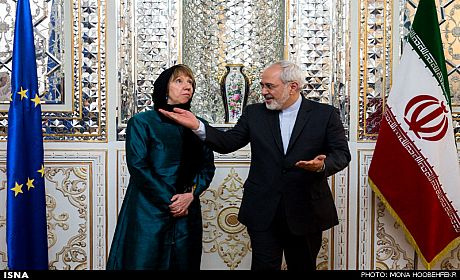Iran-Europe Relations Must Leave Shadow of Sanctions

This is the first visit made by Mrs. Ashton to Tehran. How would you assess her role in Iran’s new relations with the European Union?
Mrs. Ashton has numerous experiences in her contacts with the Iranian officials. Aside from her personal political inclinations, she has always attempted to bear in mind the EU’s considerations in Britain. There is talk in European circles of her future role in other organizations such as NATO. Of course, if I am not mistaken, it seems that she has shown a willingness to be present as a credible candidate in Britain’s election scene but that depends on her decision.
With regard to her role in new relations between Iran and the EU, it should be said that the strengthening of the agreements would play a significant role in her political record and, considering the strategic understanding and considerations, this role could be more effective than before, particularly within the framework of strategic talks between the two sides and in line with mutual security, the result of which could be regional stability and excellent relations between the two parties based on an accurate understanding of the strategic depth of the Islamic Republic of Iran. The mechanism of her meetings with our country’s officials bore an important message for her. Her detailed negotiations with Iran’s Foreign Minister, aside from her attraction to the beauty of the Mirror Hall in the Foreign Ministry, is notable.
Within the framework of regional developments, there is a new challenge now between Russia and the European Union with regard to Ukraine. How would this issue impact Iran’s new relations with the EU?
The fate of this challenge is not yet known for either side. Europe has pursued an accelerating policy in this regard and the strategy of “eastern neighbors” has been challenged. Russia seeks to change the West’s game in this area. The security of Europe’s energy has been threatened and now Europe seeks to review its policies in this regard, although the internal discussions of the EU have not yet been sufficiently matured. The continuation of the crisis in Ukraine and Crimea increases the threat of the balkanization of Ukraine. Recently, we have witnessed Britain’s reaction to Malvinas, or as Britain calls them, the Falkland Islands, or the fact that there were unilateral NATO and EU policies in the region with regard to Kosovo’s independence. On the other hand, the US pursues different policies on the issue of Tibet in China. Such cases strengthen Moscow’s power of reasoning on the issue of Crimea and Russia pursues the trend of diplomatic and legal power and discussions in different areas and the new government of Ukraine is not ready to retreat. Iran’s official positions show this concern. It is obvious that the NATOization of Ukraine is not the solution and even western politicians, like Mr. Kissinger and Brzezinski who are from two different parties of the US, have explicitly warned against the increasing role of NATO in Ukraine’s developments, although Mr. Brzezinski has expressed in his interview with Euronews that Russia is not always a successful chess player. You know well that today, in his talks with David Cameron, Mr. Putin has reiterated that it would be in everyone’s interests to resolve the issue of Ukraine diplomatically and have a stable Ukraine.
How would you assess Russia’s view of Iran’s new relations with Europe? You were Iran’s ambassador to Armenia before and Iran, Russia and Europe had a balanced and converging understanding in that area. Is there a possibility of a new triangular policy on different issues?
If we turn a little to the past, we can see that Russia showed a strong dialogue with regard to the issue of Syria and it has more confidence now. They believe that the era of Europe’s retreat must begin while Europe believes in advancing in this matter on the issue of Ukraine. There is an important contradiction in European policy and the policy of the important European countries is different from that of other European countries. The official policies differ with regard to the issue of the sale of European arms in the region. The sale of arms and insistence on advancement would lead to the growth of radicalism. The world needs peace and constructive interaction and pursuing incorrect policies would inflame an undesirable situation.
As the Russians state, the policy of sanctions is outdated. Iran’s new relations with the EU must be formed beyond the area of sanctions and futile negotiations. I believe that there is the possibility of pursuing a win-win or trilateral-win policy in some areas. Reaching absolute trilateral cooperation seems impossible but as I mentioned before this could be reached based on diplomatic creativity and belief in interaction. In the area of energy and transit, we could see an intelligent and equal evolution. Iran’s new cooperation with Europe is not against any country and no country except Israel, which spreads its negative views in this regard, is upset by the new situation. As Mr. Jalili stated, today Mrs. Ashton has become more aware of the importance of democracy in Iran and Iran’s progress.
You mentioned Iran’s new strategic approach towards Europe. What are its characteristics?
I believe that the EU must take balanced and stable steps and pursue its policies with wisdom and refrain from discussing unnecessary matters. There is an important potential in our relations. The Islamic Republic of Iran views the world on the basis of its values, independence and national interests and places importance on the recreation of security and development in its world relations. There are important issues which could advance the strengthening of bilateral relations especially in the economic field and on the basis of common interests. The Islamic Republic of Iran has its own status in regional geopolitics. Europe’s need to understand Iran’s importance is undeniable and there are opportunities for both sides.

